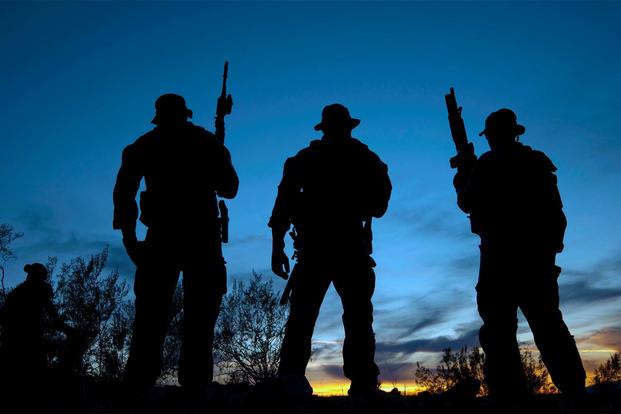In the wake of a CBS News investigative report describing a "staggering" illegal drug use problem among the Navy's elite special warfare operators, officials with Naval Special Warfare Command are pushing back, saying the data simply don't support that account.
CBS interviewed three anonymous SEALs, two retired and one active duty, who alleged that drug use is growing among the SEAL teams and that leadership is turning a blind eye to the problem.
The report, which aired Tuesday, also revealed that Capt. Jamie Sands, commander of SEAL teams on the East Coast, had ordered a "safety stand-down" in December, after five troops were kicked off the teams for drug use. Sands video-taped a lecture that all 900 operators under his command were required to watch in which he said he felt "betrayed" by the SEALs' behavior and was watching their elite culture erode before his eyes.
Data provided to Military.com by Naval Special Warfare Command show that seven members of the command did test positive for drug use in November and December 2016, out of 6,364 tests administered during that period. That positive rate, 0.1 percent, is slightly higher than the command's average over the last three years, but well below the Navy's fiscal 2016 average of .67 percent, according to the data.
That period represented a forcewide sweep for Naval Special Warfare, said Capt. Jason Salata, a spokesman for the command. Labs determined that 10 of the samples were positive for one or more drugs. Three of the individuals with positive tests were granted waivers, one for innocent ingestion and two for valid medical prescriptions, he said.
All seven of the remaining troops who tested positive were processed for discipline and administrative separation.
This data were also provided to CBS, but did not feature in the report, officials said.
Since August 2014, Naval Special Warfare Command has performed 71,436 urinalysis drug tests and seen 52 illicit drug use positives, for a positive rate of .07 percent, according to the provided data. In that span of years, drug positives for the Navy as a whole were nearly 10 times that rate, at .58 percent in 2014, .6 percent in 2015, and .67 percent in 2016.
The 52 positives in NSW confirmed to be linked to illicit drugs belonged to 28 people, some of whom had multiple positives. Nine additional positives involved steroid use.
Discipline for these sailors was varied, data reveal. Of the nine who tested positive for steroids, three were granted waivers for valid medical prescriptions, two received non-judicial punishment, and one separated as a result, one is pending action, and three received no punishment, according to officials.
Of the 28 who tested positive for illegal drugs, all were processed for administrative separation, some multiple times, according to the data. This means that the individuals in question were sent to an administrative separation board to determine whether they should be allowed to stay in the service. In 27 cases, the drug positive resulted in non-judicial punishment or court-martial. In some cases, disciplinary actions are still pending.
"Discipline is within the authority of a commanding officer, and we respect a commanding officer's discretion as to whether or not discipline separate and apart from the required administrative separation process is pursued," Salata said in a statement.
Data that show some troops were able to test positive multiple times may be cause for concern, and actions including the safety stand-down indicate that drug use trends were troubling enough to send a clear message to the community about the command's position. But officials told Military.com the message sent was that even one illegal drug positive is too many.
"Drug use is incompatible with NSW values. It endangers the health and safety of the abuser and his teammates and harms the effectiveness of the Naval Special Warfare team," Rear Adm. Timothy Szymanski, commander of Naval Special Warfare Command, said in a statement. "Our policy on drug abuse is 'zero tolerance,' plain and simple. Anything above zero represents a disturbing trend for this elite force."
-- Hope Hodge Seck can be reached at hope.seck@military.com. Follow her on Twitter at@HopeSeck.




























